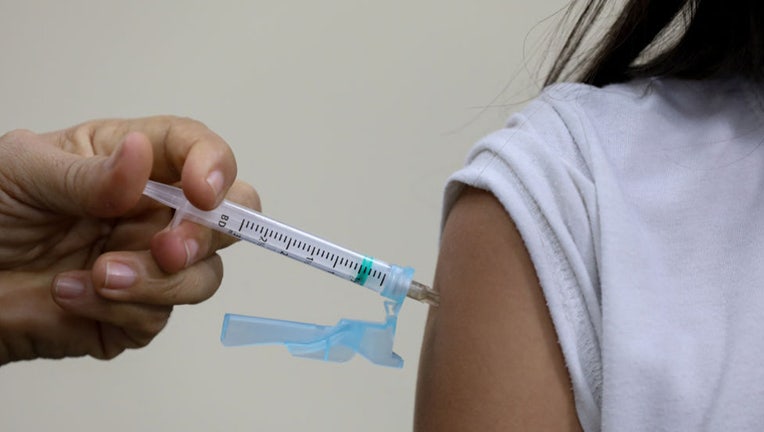
FILE – A girl receives a vaccine in Manaus, Amazonas State, Brazil, on Feb. 22, 2024. (Photo by MICHAEL DANTAS/AFP via Getty Images)
A novel vaccine designed to target one of the most common cancer-driving mutations in patients with pancreatic and colorectal cancer is showing promising results, according to a recently published study.
Researchers from the University of California said patients “developed strong immune responses” to the new vaccine and “remained disease-free.”
Phase 1 trial
Dig deeper:
The vaccine, called ELI-002 2P, showed evidence of triggering a powerful and lasting immune response.
It may also help prevent or delay cancer regrowth in high-risk patients with tumors that are driven by KRAS mutations, according to a UCLA Health news release.
The study, published in Nature Medicine on August 11, found that 21 of the 25 participants had an immune response to the KRAS mutations.
The patients generated helper cells (CD4+) and killer cells (CD8+) that staved off further growth of tumor cells.
By the numbers:
KRAS mutations are found in about 25% of tumors, according to the study.
This mutation drives about 90% of pancreatic cancers and 50% of colorectal cancers.
What they’re saying:
“Targeting KRAS has long been considered one of the difficult challenges in cancer therapy,” said the first author of the study, Zev Wainberg, MD, professor of medicine at the David Geffen School of Medicine at UCLA and researcher in the UCLA Health Jonsson Comprehensive Cancer Center. “This study shows that the ELI-002 2P vaccine can safely and effectively train the immune system to recognize and fight cancer-driving mutations. It offers a promising approach to generating precise and durable immune responses without the complexity or cost of fully personalized vaccines.”
What’s next:
Researchers have completed enrolling patients for a larger phase 2 study for the ELI-002 7P vaccine, which will target a broader set of KRAS mutations.
The Source: Information for this article was taken from a study published in Nature Medicine on August 11, 2025, and a UCLA Health news release.
Source link
